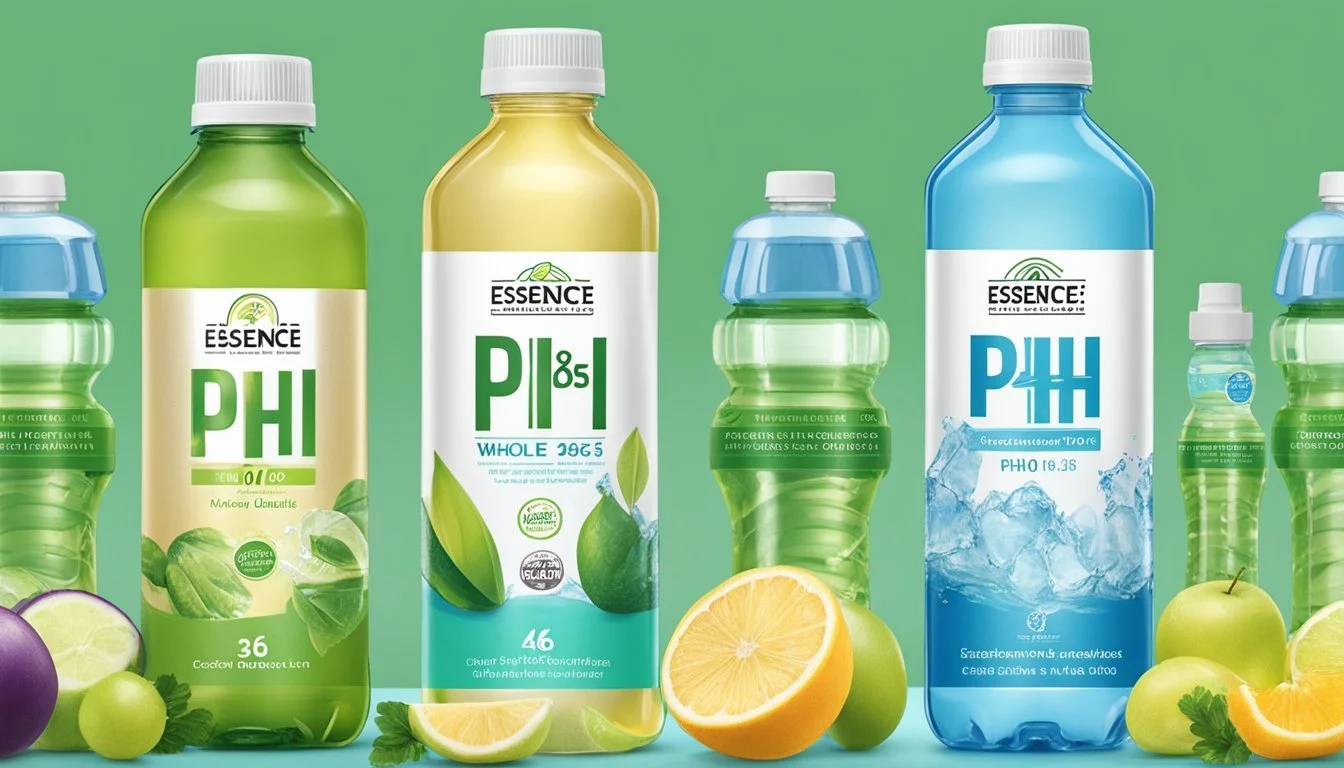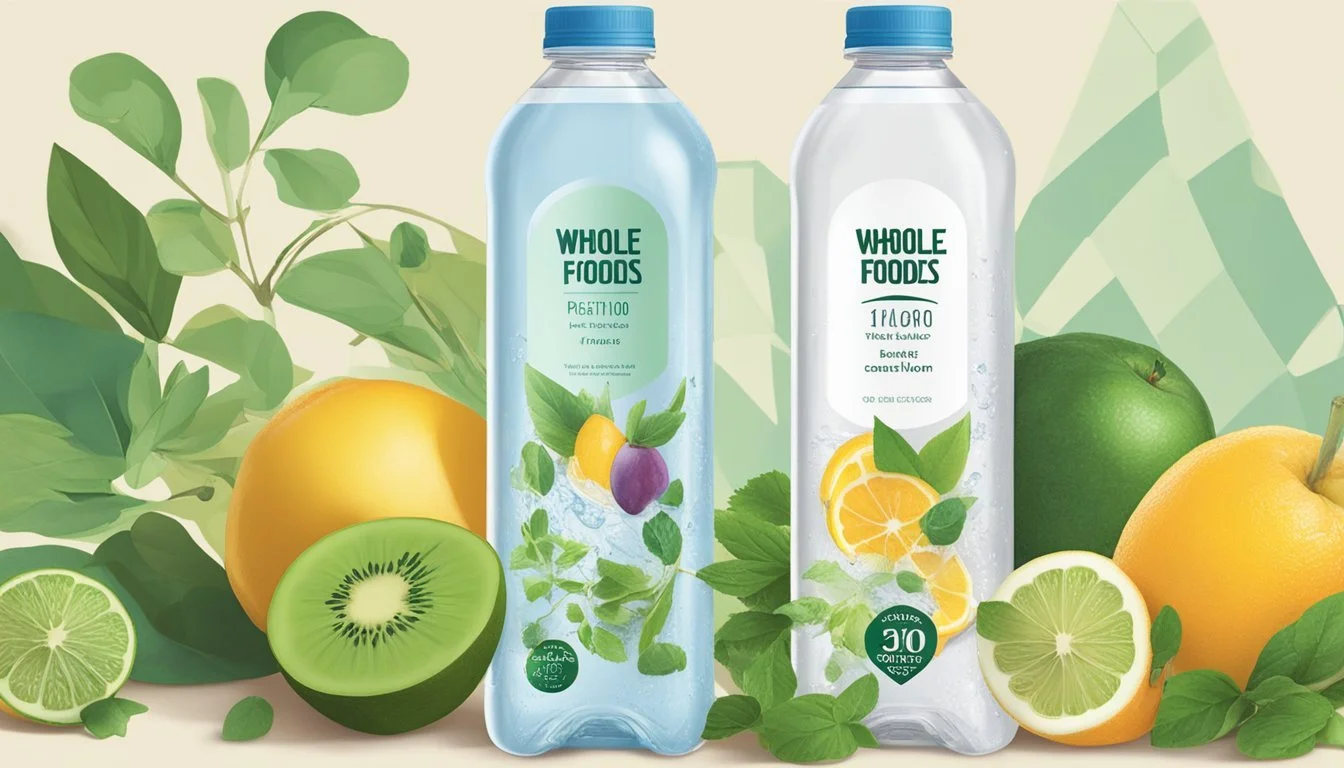Whole Foods 365 vs. Essence pH10
Comparative Bottled Water Analysis
When it comes to choosing between Whole Foods 365 and Essence pH10, consumers often find themselves weighing distinct attributes such as taste, mineral content, and pH levels. These factors directly influence the quality and perception of each brand. Whole Foods 365 offers a cost-effective option without sacrificing basic quality, making it a favorite among budget-conscious buyers.
Essence pH10, on the other hand, has carved out a niche with its higher pH level and unique mineral composition, often appealing to those who prioritize premium characteristics in their hydration choice. For those seeking optimal taste and alkaline balance, Essence pH10 might be the superior option.
Understanding these distinctions can streamline decision-making and ensure consumers select the best fit for their hydration needs. By comparing both brands, readers will gain insights into which bottled water meets their personal preferences.
Overview of Whole Foods 365 and Essence pH10
Whole Foods 365 and Essence pH10 are two prominent bottled water brands, each with its unique approach and offerings. This overview delves into their brand histories, philosophies, product ranges, and availability.
Brand History and Philosophy
Whole Foods 365 is a private label brand by Whole Foods Market, launched to offer high-quality products at more accessible prices. The brand aims to make healthy, organic, and responsibly-sourced products affordable. It maintains Whole Foods Market's standards by emphasizing transparency and ethical sourcing.
Essence pH10 focuses on providing water with a high pH level for health benefits. The brand is known for its alkaline water, which is ionized to achieve a pH over 10. Essence pH10 markets this as a way to balance body acidity, and it emphasizes purity and wellness.
Product Range and Availability
Whole Foods 365 offers a diverse selection of products across various grocery categories, including bottled water. Their water options include Alkaline Water (pH 9.5+) and Electrolyte Water, catering to different hydration needs. These products are available in Whole Foods Market stores and online, often sold at competitive prices.
Essence pH10 focuses almost exclusively on high-pH alkaline water. Their flagship product is the Essence pH10+ bottled water, marketed for its health benefits. Availability extends to grocery stores and convenience stores, making it accessible to a broad audience. Essence pH10 often highlights the quality and purity of its water sources.
In sum, while Whole Foods 365 offers a range of accessible, health-focused products, including water, Essence pH10 targets consumers seeking the specific benefits of high-pH water.
Water Source and Origin
Whole Foods 365 and Essence pH10 differ significantly in their water sources and purification methods. Whole Foods 365 sources its water naturally, while Essence pH10 uses advanced purification techniques. Understanding these differences can help in making an informed choice.
Natural Sources and Spring Water
Whole Foods 365 sources its water from natural springs in the USA. Natural spring water typically contains minerals and electrolytes that contribute to its taste and potential health benefits. Spring water is collected directly from protected underground sources, making it a popular choice for those seeking a more natural product.
The naturally occurring minerals in this water can include calcium, magnesium, and potassium. The USA origin assures consumers of strict adherence to regulatory standards for spring water sourcing and bottling, ensuring safety and quality.
Reverse Osmosis and Purified Water
Essence pH10 undergoes a thorough purification process, primarily through reverse osmosis. This method removes impurities by forcing water through a semipermeable membrane, ensuring high purity levels. Reverse osmosis makes Essence pH10 free from contaminants like chlorine and fluoride, commonly found in tap water.
Essence pH10's water source includes various regions but emphasizes places like the Bahamas, notably Kamalame Cay, ensuring pristine quality. The process adds a high pH level, known as alkaline water, which some believe provides additional health benefits. Essence pH10's approach ensures consistent quality, making it reliable for consumers prioritizing purity.
Filtration and Purification
Both Whole Foods 365 and Essence pH10 undergo rigorous filtration and purification processes to ensure high water quality. These processes play a critical role in determining the purity of the water and the removal of impurities.
Filtration Processes
Whole Foods 365 bottled water typically uses a multi-stage filtration process. This usually includes reverse osmosis, which effectively removes a wide range of contaminants, including heavy metals and bacteria. This ensures the water is almost entirely free of dissolved solids.
Essence pH10, on the other hand, employs advanced filtration techniques such as activated carbon filtering and UV sterilization. Activated carbon filters are particularly good at removing organic compounds and chlorine, improving both the taste and safety of the water. UV sterilization adds an additional layer of protection by eliminating any remaining microorganisms.
Both brands are committed to delivering high-quality water, but their specific filtration methods highlight different strengths in addressing various contaminants.
Purity and Impurities
The purification process is crucial for achieving the desired purity levels in bottled water. Essence pH10's purification process includes ozonation, which ensures the reduction of any remaining bacteria or viruses after initial filtration. This results in water that is exceptionally clean with a slightly alkaline pH, beneficial for hydration.
Whole Foods 365 also prioritizes purity through steps like deionization and microfiltration. These methods are highly effective at removing both dissolved inorganic substances and microorganisms, resulting in ultra-pure water. The end product often has fewer impurities, catering to consumers who prefer water with minimal chemical content.
Both products maintain stringent standards for purity, making each a reliable choice for clean and safe hydration.
Health and Hydration
The health and hydration benefits of Whole Foods 365 and Essence pH10 bottled waters stem from their distinct mineral contents and properties. Here’s a detailed comparison.
Hydration Benefits
Essence pH10 boasts a high alkaline level with a pH of about 10. This high alkalinity claims to provide superior hydration, especially for those sensitive to acidic beverages. The smooth taste can encourage higher water consumption, which is crucial for maintaining optimal hydration levels.
Whole Foods 365, on the other hand, is a non-carbonated, purified water option. While it doesn't emphasize a high pH, it still fulfills the essential need for hydrating the body. This brand is easily accessible and offers a clean, neutral taste that can be appealing to a broader audience.
Both options contribute to essential hydration needs, promoting overall wellness and balancing body fluids. Selecting between the two depends on individual preferences for taste and additional health benefits.
Mineral Content and Health
Whole Foods 365 provides basic hydration without strong emphasis on added minerals. It’s a good choice for those who prefer simplicity in their water without any distinctive mineral taste.
Essence pH10 is rich in minerals like calcium, potassium, and magnesium.
Calcium supports bone health.
Potassium regulates muscle and nerve function.
Magnesium contributes to muscle relaxation and bone density.
These minerals can enhance the health benefits of making Essence pH10 the preferred option for those looking to supplement their mineral intake through their hydration choices.
Nonetheless, for everyday hydration, both Whole Foods 365 and Essence pH10 are effective, with the choice hinging on individual health goals related to mineral intake and taste preferences.
Water Quality and Safety
The quality and safety of bottled water are crucial for consumers making an informed decision. Both Whole Foods 365 and Essence pH10 have distinct processes and standards that impact their water's quality and safety.
Testing and Safety Standards
Whole Foods 365 and Essence pH10 adhere to different testing and safety protocols. Whole Foods 365 is sourced from springs, and the company performs regular testing to ensure compliance with FDA and EPA guidelines. This includes monitoring for contaminants and maintaining stringent purification processes.
Essence pH10 uses advanced ionization and filtration to achieve its high alkaline levels. This process also involves rigorous testing to meet safety standards. Essence pH10's purity is ensured by removing impurities through multiple stages of filtration, achieving a balanced pH level and maintaining high safety standards.
Lead, Arsenic, and Heavy Metals
Ensuring bottled water is free from lead, arsenic, and other heavy metals is essential. Whole Foods 365 conducts tests to detect these harmful substances, adhering to EPA safety limits. The water goes through a purification process that minimizes the presence of toxic metals.
Essence pH10 emphasizes its high-level filtration system designed to eliminate heavy metals. Through advanced ionization, impurities like lead and arsenic are filtered out, resulting in water that meets stringent safety regulations. This ensures that the water remains safe for consumption and aligns with health standards.
By focusing on these factors, consumers can better understand the quality and safety of the bottled water they choose, ensuring it meets their health and safety needs.
Taste and Flavor Profile
Both Whole Foods 365 and Essence pH10 offer distinct taste experiences and flavor profiles highly influenced by their unique mineral content and electrolytes.
Electrolytes and Flavor Enhancement
Whole Foods 365 coconut water is known for its subtle, sweet flavor directly derived from 100% coconut juice. This natural sweetness is complemented by the electrolytes it contains, such as potassium, which enhances its refreshing taste without overwhelming the palate.
Essence pH10, on the other hand, features a balanced mineral content, including magnesium and calcium, which contributes to a crisp and clean taste. Its electrolytes efficiently promote hydration, and the slightly alkaline pH level adds to the smooth, satisfying flavor many customers prefer.
Aftertaste and Flavor Comparison
Whole Foods 365 leaves a mild aftertaste that retains the natural coconut essence without any artificial notes. This makes it appealing for those who enjoy a straightforward, fresh coconut flavor that lingers lightly.
Essence pH10 offers a different experience. The mineral balance ensures a neutral aftertaste, free from any strong or metallic flavors. It finishes cleanly, appealing to consumers who prefer a pure water taste without residual flavors.
In summary, Whole Foods 365 provides a sweet, natural coconut flavor profile with a light aftertaste, while Essence pH10 delivers a crisp, mineral-enhanced taste with no lingering aftertaste.
Technical Aspects of pH Levels
Understanding the technical aspects of pH levels is crucial when comparing bottled water brands like Whole Foods 365 and Essence pH10. Key components such as pH balance, alkalinity, ionization, and mineral presence determine the quality and taste of the water.
pH Balance and Alkaline Water
The pH level measures the acidity or alkalinity of water on a scale from 0 to 14. A pH of 7 is neutral, below 7 is acidic, and above 7 is alkaline. Whole Foods 365 typically falls within a pH range that is more neutral, which some consumers find preferable for its balanced taste.
Essence pH10, on the other hand, markets itself as alkaline water with a higher pH level around 9 to 10. Alkaline water is believed to neutralize acid in the bloodstream and offers benefits like improved hydration and bone health.
Waiakea water, mentioned in the search results, is naturally alkaline, ranging between 7.6 and 8.2, providing another point of reference. Consumers might prefer alkaline water for its potential health benefits and smoother taste profile.
Ionization and Mineral Presence
Ionization in bottled water refers to the process that increases the water's pH level, making it more alkaline. Ionization can be achieved through natural processes, such as passing water through mineral-rich rocks, or artificial means, like electrolysis. Essence pH10 undergoes ionization to attain its high pH, setting it apart from traditionally bottled waters.
Mineral presence significantly affects both the taste and pH level of the water. Whole Foods 365, being a spring water, contains a natural blend of minerals but tends to be less mineralized compared to brands like Waiakea or Essence, which boast higher mineral content.
Minerals like calcium, magnesium, and potassium contribute to the water’s alkalinity and health benefits. These elements can be critical in the consumer’s choice between different bottled water brands.
Package Design and Sustainability
When comparing Whole Foods 365 and Essence pH10, packaging design and sustainability are critical considerations. These factors not only impact the environment but also influence consumer choice.
Environmentally Friendly Packaging
Whole Foods 365 focuses on minimizing environmental impact by using recyclable materials in their packaging. They ensure that their plastic bottles are made from recycled PET (rPET), which reduces the demand for new plastic production.
Essence pH10 also emphasizes sustainability by implementing advanced packaging technologies. Their bottles are designed to be lightweight, reducing material use and transportation emissions. Additionally, Essence pH10 partners with programs to enhance recycling rates, ensuring that their packaging has a longer life cycle and fewer environmental drawbacks.
Glass Bottles vs. Plastic Bottles
Whole Foods 365 provides alternatives to plastic by offering some of their water products in glass bottles. Glass, being inert, does not leach chemicals into the water, making it a safer choice for health-conscious consumers. However, glass is heavier and requires more energy to produce and transport, impacting its overall eco-friendliness.
Essence pH10 focuses more on optimized plastic packaging. Their use of rPET not only reduces environmental impact but also offers a more practical solution in terms of weight and durability. While glass is favored by some for its purity, plastic remains the more efficient option in terms of lower emissions during transport and reduced breakage risks.
Both brands strive to balance sustainable practices with practical packaging solutions, catering to diverse consumer needs and environmental concerns.
Additional Content and Claims
Whole Foods 365 and Essence pH10 bottled waters offer different benefits. The focus here will be on their nutritional additives, ingredients, organic certifications, and the presence of GMOs.
Nutritional Additives and Ingredients
Whole Foods 365: The 365 Everyday Value Spring Water contains no added sugars or artificial additives. It is sourced from natural springs and undergoes minimal processing. The Alkaline and Electrolyte variations contain added minerals for enhanced taste and hydration benefits.
Essence pH10: Known for its high pH level, Essence pH10 is marketed as providing hydration benefits due to its advanced ionization and filtration processes. It includes added minerals aimed at balancing the body's pH levels. There are no artificial additives or sugars listed in its ingredients.
Comparison: Essence pH10 focuses on high alkaline content and mineral balance. Whole Foods 365 provides multiple options with varying mineral content, catering to different consumer preferences.
Organic Certification and GMO Presence
Whole Foods 365: This brand does not specifically advertise organic certification for its bottled water. There is no information indicating the presence of GMOs. Given that it is a product line of Whole Foods, which emphasizes natural and organic offerings, the assumption is that it adheres to similar standards of quality.
Essence pH10: There are no claims regarding organic certification or non-GMO status for Essence pH10. Its branding focuses more on pH levels and mineral content than on organic or GMO-free certifications.
Comparison: Neither brand prominently features organic certification or non-GMO status in their marketing. Whole Foods 365 might benefit from the general perception of Whole Foods standards, whereas Essence pH10 emphasizes scientific filtration and mineral addition over organic credentials.





